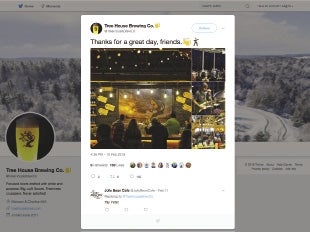Ah, yes, Monday. The day the brief reprieve from the daily grind of the office ends, and it’s back to work.
If you find yourself casually browsing Facebook before you actually start work on Monday, your day might get a little better if you scroll by The Queen’s Cups posts.
Every Monday, the Worcester cupcake shop posts to social media photos of dogs eating pupcakes, which – of course – are cupcakes for our canine friends.
Customers take photos of their pups eating the treats and send them to The Queen’s Cups, which are posted every Monday.
“Nobody wants to wake up Monday morning and start the work week,” said Renee King, owner of the shop. “It’s a fun thing for people to look at.”
Hundreds of pupcakes are made every weekend to keep the series running on Facebook and Instagram, King said. The 20-employee cupcake shop has more than 16,200 Instagram followers and another 13,600 on Facebook.
Direct, intimate customer connection
For a small dessert shop with no marketing team, connecting to customers on social media has become one of the most important undertakings, King said.
With a menu changing every day, social media has become the store’s daily newsletter.
“People say ‘Oh, I saw this online and I had to come in.’ We hear that all the time,” King said.
The intimate level of interaction social media provides with customers has been an extreme benefit to small businesses, said Julie Frechette, a marketing professor at Worcester State University and Clark University.
Social media has delivered small businesses a path around robotic marketing campaigns and a way into homes of current and prospective customers, Frechette said.
“It’s not a hard sell anymore,” she said. “It’s about creating engagement and much more about developing a long-term relationship that’s more equitable.”
Social media, Frechette said, allows customers and clients to have an enormous voice on social media through ratings, comments, likes and dislikes. Those tactics not only build more trust, but also a larger customer base once the business catches digital fire.
“That’s going to carry much more weight than if it’s coming from some executive behind a desk,” Frechette said.
Seed To Stem’s far-reaching community
If not for Instagram, Worcester’s plant and lifestyle boutique Seed To Stem probably wouldn’t have the amount of customers it has.
The account has more over 23,000 followers, many of whom aren’t even from Central Massachusetts, said co-owner Virginia Orlando. Most customers were first introduced to the store on Instagram, and those customers come from all over New England.
“Once that started happening, we made sure to keep up with it,” Orlando said.
A post shared by SEED TO STEM (@seedtostem) on Feb 12, 2018 at 4:01pm PST
The store has even had some of its Instagram fans visit from as far away as Australia.
Instagram “really gets people in the doors,” she said.
Along with the closer connection comes the ability to demonstrate the human element of every company, Frechette said.
More creativity and a much less corporate marketing strategy helps build trust rather than sales.
“That says, ‘I care about you, and I’m willing to put together a service or product for you,’” Frechette said.
Tree House’s updates
Charlton beermaker Tree House Brewing Co. has nearly a quarter million followers on Instagram, Twitter and Facebook combined.
The most active of the three accounts is Twitter, where the company posts multiple daily updates about what beers it is selling that day, how long the line to purchase beer is (it can grow to several hours) and what customers are saying about the company.
Perhaps most famously, the brewery retweets photos of its colorful cans in far away places, a testament to the brewery’s reach.
Because the brewery sells its products only at the Charlton site, these updates help manage the daily logistics of servicing customers while helping to create the cult following where customers will drive several hours to buy the various beers, two of which – Good Morning and King Julius – are ranked in the top 10 tasting in the world by Boston-based ratings website BeerAdvocate.
The deadhorse vibe
Worcester restaurant deadhorse hill makes an effort to capture its human element, posting not only images of appetizing dishes, but of the eatery’s workers and customers.
“The thing that’s really important to us is not just letting people know what’s going on with our food, but helping the guest get the feel for the type of environment we have here,” said Julia Auger, deadhorse general manager.
The restaurant has more than 3,100 followers on Instagram and 2,800 likes on Facebook, relying on its employees’ personalities to connect to current and potential customers.
“Chimney hill ducks getting dat date glaze,” reads a Dec. 30 Instagram post of an employee preparing ducks from Chimney Hill Farm in Petersham.
“We’re here to heat up your life, and we bottled our hot sauce. On sale for you, your family and friends,” reads another from Nov. 30 of a team member holding probably too many bottles of the restaurant’s hot sauce.
A post shared by deadhorse hill (@deadhorsehill) on Nov 30, 2017 at 2:25pm PST
It’s also the restaurant’s habit to shout out to its local vendors, like Chimney Hill.
It’s a much more lax approach to marketing, throwing out slogans or song lyrics Auger hears from her younger staff.
However, only the best photos and videos make the cut, evidenced by the dozens of outtakes stored on Auger’s phone.
“I should probably post more about the food than trying to capture these moments that happen here, but it’s something that’s important to our operations,” she said.

